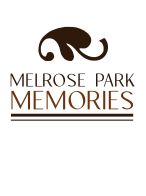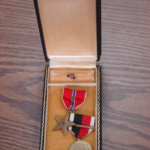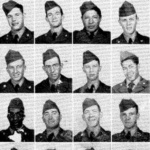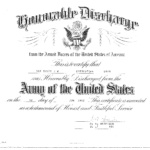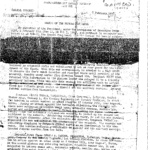JW Scott
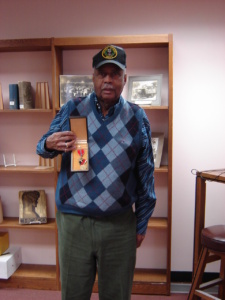
Name: JW Scott
Rank: Platoon Leader
Date of Birth: 1931
Place of Birth: Mississippi
War: Korean War
Dates of Service: 1950 – 1952
Branch: US Army
Unit: First Calvary Division
Locations: Korea, Japan, Texas
Prisoner of War: No
Awards: Bronze Star
Interview Transcript
This is Fidencio Marbella with the Melrose Park Public Library. We’re today speaking with J.W. Scott of Bensenville, Illinois. I’m also here with Heidi Krug also with the Melrose Park Public Library. Okay, let’s go ahead and get started. Why don’t you tell us when and where you were born.
I was born in Mississippi, 1931. I went into the service November 28, 1950 and I served in the Korean War and I did occupation in Japan and returned to stateside. I was shipped to, sent to Texas, Fort Hood, Texas as a tank commander and that’s where I was discharged from.
Why don’t you tell us a little bit, why don’t you tell us what you were doing before you joined the service.
I was picking cotton. I worked in Mississippi at all kinds of jobs. Yeah, I want to mention that my grandparents, they were old slaves and as I grew up I worked, helped support the family. And by the way my father, he was killed in service in 1945 and then I went in the service in 1950.
Did you have any other family members that served in the armed forces?
My son, he served in Vietnam.
All three generations served our country.
Right. He also lives in Rochester, Minnesota.
Why don’t you tell me how you ended up in the U.S. Army? Were you drafted or enlisted?
I was drafted, I was U.S.
What year was that?
I went in November 28, 1950. By April I finished my basic training and was on the frontlines in Korea, the last of April.
They didn’t give you very much time, did they?
No.
Now where did you have your basic training?
Camp Chaffee, Arkansas and when they sent me to the frontlines, the line was in Seoul, right across Seoul, that was the first combat I’d seen, Seoul, Korea.
Let’s go back a little bit to your basic training. What was that like? Was it a big adjustment for you to serve in the Army? From your civilian life?
It was. It was a lot different but you know being from Mississippi we had some problems too. And after I went into service, I took basic training which was the foundation but one day in combat you learn more than you do in the whole time in basic training.
Now back then, was the army still segregated or was that breaking down by then?
It was being integrated. In fact I was one of the first men and a fellow from Pennsylvania, we were the first two blacks went into the First Cavalry Division. And believe me, they were glad to see us because there were a lot of problems in Korea at that time. That’s why I went so fast.
So you didn’t have a lot of problems with the other men in your unit?
I didn’t have any problems until I got back to the States.
Really?
Yeah. After I got back to the states I had a problem because after I was sent to Texas we were riding in, with some of the fellows from when I was in combat they wouldn’t even sell them gas in Texas because we were in the back seat.
Unbelievable.
Yeah.
So after you served your basic training, where did you go from there? Did you go straight to Korea?
After, I went straight to Inchon, Japan, I mean Yokohama, Japan and I processed, I was there just outside of Tokyo and then from there straight to the frontline in Korea.
What was it like leaving the U.S. to go to Japan? It was a boat that you traveled on, how long a trip was it?
Yeah, a boat, fourteen days, the General Mitchell, a ship that was the General Mitchell.
A transport?
Yeah.
What was that like? Had you ever been on a big ship like that?
No I hadn’t.
What was that like? Can you tell us a little about it?
It was scary. You didn’t even think about a boat ride when you know where you’re going.
Then you ended up in Yokohama, Japan where you were processed.
Yeah. It was a camp right outside Yokohama where we processed to go to Korea. Then it was three days down the Yellow Sea to Korea.
So you went from Japan to landing in Korea. Where did you land in Korea?
Inchon.
You were part of the Inchon landings there?
It wasn’t invaded, an invasion, no, but I went to Inchon.
What was that like in Korea, your first impressions in Korea?
Well actually, straight on the front lines, it was scary.
What unit were you with?
I was in with the First Cavalry Division.
What kind of weaponry did you have, were you on tanks or were you infantry?
I was infantry. First Cav was infantry, as you’ll see in the papers. I was in hand-to-hand combat.
So you went straight into combat from Inchon.
Yeah, went straight to Seoul. That’s where the front line was.
In Seoul?
Yeah.
So you got there after the North Koreans invaded the south. You were sent there after . . .
I was sent there after, what happened when I was called up they had pushed American soldiers, at first we were above the thirty-eight parallel. They were pushing us off the island and that’s why I went so fast because they needed people there right away.
Give me your first impressions of going into combat. What was that like?
Well, naturally it was scary. It was always, even when we got a rest and they say you’ll have to go back upfront tomorrow and you see so many going and not coming back.
How long were you there on the frontlines?
At one time we were, the longest we stayed on the frontlines was three months. They’d pull you back after a month and put somebody else in front of you so you could rest. It was every day we had our packs on our backs. We had, it rained just about every day, we were over the mountains, we were being shot at and, well what can I say? What was it like? And you, actually how you wound up going back to Japan to do occupation because we were just about annihilated, just about eliminated my outfit, the First Cavalry at that time. You’d pull back up to strength today. You’d have two hundred fourteen men and this evening you might have fifty. It was just that bad. It was war. And all you’d see every day was trucks body-hauling back. When they could get to us, we had good food. But a lot of times you’d see people coming to bring you some food and they’d hit a minefield. Most of the time you had Koreans, the Koreans had the packs on them to bring the food up the mountain because trucks couldn’t get up there. If they hit a mine or something, you lost. So then we had C-rations. The whole time, you don’t know how great it is to see electric lights. The whole time I was in Korea, I didn’t even see, well I did go back to Seoul once for a rest and I got to see electric lights. Running water, we didn’t have running water. When you weren’t being shot at you took a bath in a creek if you could find one. Your washroom, you just had to dig a hole.
Pretty primitive conditions for our frontline soldiers then.
Yeah, and then there was a time we were ordered to take this hill. I don’t know if you’ve ever heard of Bloody Baldy, it’s probably in this book. So they told us, for us to take this hill where we stopped on one end to lay down a base of fire. So after we did that, for a while until about three o’clock in the evening, they said we’re going to change, just continue to lay down a base of fire. The base, you’d shoot into the hill. We had artillery, mortars, everything. So then they pulled another company through us and you’d just continue doing what you’re doing. They’re going to pull through you and they’re going to go up and take the hill. So I guess by about night, about first night they pulled through us after they got down in the mountain. After they went down into the valley rather, they called for an air strike on that mountain. That’s why they called that hill Bloody Hill, Bloody Baldy. So when they called for the air strike ninety percent of those people down in the valley waiting to go up the hill got killed. So now they said that we had to go. By that time it had to be about midnight. We had been out on that hill all day. You could be as close to a person as I am to you but you couldn’t say anything because we were all mixed up. Because if you said something and find out you’re Americans, you’re gone. The next morning we got up, there was a head here, an arm there, a leg and then the Chinese, they had, well what I’m saying is that it was Korea, but it was Chinese actually that we were fighting. They had tunnels in their holes and with all the air strikes some of them were buried in their holes. So we just had to hold that position for a while. We just rolled the bodies down, and oh that smell, all the blood.
Now what were your responsibilities for the unit that you were in?
Well I was a platoon leader.
So what was it like leading men in combat?
It was great, and the men had a lot of confidence in me. I wouldn’t ask the men to do something I wouldn’t do. And to go back, I guess I’m getting a little ahead of myself, but even when I got this Bronze Star you’ll see some of the stuff on there that happened. We had been fighting night and day. So we went on this patrol without any frontline, near Panmunjon, up north of the thirty-eight parallel. So my platoon lieutenant, he sent one squad out in front. That’s what they call a milk run because we thought we weren’t going to run into any resistance. So we all stayed at the bottom of the hill. After we got, well after about fifteen or twenty minutes one of the guys came back and said there was something in that village up there. So the second lieutenant told me I know the way you’ve been going your nerves are all cracked up and there were a lot of guys just cracked up. He told me you take two squads and go up there and see what’s going on. So I took my assistant with me, went down and we walked straight down right into there. I had a simple machine gun, for a guy to come on this side, one on that side so we could have a crossfire. So after we got over, must have been a hundred feet from them, they opened up on us with everything. So I had a carbine and it threw about a hundred feet in front of me and every time I would pull it up it would snap. But it wasn’t the gun. What happened was we had been in the rain and the carbines had a magazine on them that wasn’t feeding and the guy that was about as close to me as you, he got shot right through the head. All the other guys, they were firing when they could. I took that automatic rifle he had, because he had an automatic rifle with him and I actually took that gun and the barrel burned just like paper and I had all the other guys to get out and I stayed there alone and laid down a base of fire until after they got out. Then they shot over my head and they just had the rice paddy walls, just over my head, you didn’t have much cover. I got all those guys out except for the one next to me, he got killed. You couldn’t even touch that rifle, it was burning like paper because I was feeding it so fast, you’re supposed to shoot in short bursts.
How many men were in your platoon?
I brought in eighteen, eighteen men, two squads of nine men, eighteen. They estimated that in that perimeter there, there were about four hundred people that we were up against, about four hundred.
These were Chinese?
Right, and then I tried to call down to the bottom of the hill to get some help, but they had jammed our frequency and I couldn’t make contact. They could hear fine, but I couldn’t even call in to let them know. Then after I got back we called in napalm and that was a beautiful thing because the planes came in with all that and it was just a ball of fire across there.
Now this was near Panmunjon?
Yeah, it’s all here, yeah.
What year was that?
This was in ’51. It’s all right here.
Just a little background on Korea, it started with the North invading the South and the U.S. sent troops there to fight back the North Koreans? At what point did the Chinese enter the war?
The Chinese, they were supporting North Korea all the time. In fact I think they were really behind the whole thing.
After you got your men and yourself back down off that hill, what happened next?
That’s what I said, they called in the air strike and they burned, napalm, put a lot of that and casualties were really heavy after that.
After you came back down and the air strikes came in, what happened next?
Well, the same thing, you’re fighting, we weren’t going anywhere. We set up, well we were on patrol at this time, we pulled back to our original position. See, on the front lines, we have a, well I don’t know what they’re doing now, we had a line all the way across Korea and the front line was next to us, to my unit and every unit, if you got ready to move you had to get permission for someone else to hold that position so they don’t get behind you. So after we were on patrol, we would pull back to our regular position. Somebody else was holding our position while we were on patrol.
So how often would you do these patrols?
It could be anytime because sometimes we would, they might say patrol out to catch enemies just for information, so there was no certain time.
Were they usually at night, these patrols?
Some at night. If you wanted to go behind the lines, infiltrate behind the lines, that was night. Their line. Now, in the daytime you just go on a regular patrol. You’ve got a front line but usually it’s called a reconnaissance. You go out for information.
What kind of information were you looking for?
Well, like I just said, we were just checking to see what was there.
Just to see where the enemy was?
Right, at that particular time, but you could be there for any reason.
What were some of those reasons you’d go out? Could you tell us about that? Would you go out there for prisoners?
Well if you would try and go out there at night, go out and try to get prisoners for information, yeah. But actually you really didn’t know.
Did you ever capture any of them?
Oh yeah.
What was that like?
Well, it’s a long story. On e night we were, see another thing, on the line you and your partner, you’re in a foxhole and somebody’s awake twenty-four hours a night, a day. You sleep an hour, I sleep an hour, we do that. We had a Chinese come up to surrender and he had a fit, scared him to death.
So you didn’t actually have to go out and get him.
That was just one incident, yeah one incident that happened.
He was like a deserter?
Yeah, he wanted to give up, he wanted to surrender, he was tired of it. There were so many people, some, a lot of people got hit and so much blood and you always had your medic with you and they would, they had drugs and stuff and when they got to you they had liquor rations and cigarette rations, I started drinking a lot of liquor, but I never, and that’s something I can say and I thank the good Lord, I never had reefer, everything was plentiful right there. Nothing, but I did drink my share of liquor.
Now after serving on the front lines for how many months, you got some R&R?
Sometimes you go on the front lines, you stay a month. Sometimes you stay three weeks. It depends on the demand, how much they need you.
When you weren’t on the front lines, where did they send you?
When you’re on the front line, you’d still be in Korea, but somebody else would be in front of you. Somebody else would be hit before you. Now you could be fighting anywhere you’d be. There were air strikes, mortar rounds would come in, artillery or something like that. You didn’t have to be on the front lines for that.
How long was your unit there before they withdrew you?
They were there when I joined them. They were there for the beginning and like I said, I went in ’50. I entered the service in ’50 and I joined 1st Cavalry in April and we were there about a year, to next March, about eleven months.
So after the eleven months were up, where did you go? What were your responsibilities after you left Korea?
Well, actually when I left Korea, they had what they called rotation to come back to the States, but when I left Korea, they had pulled rotation so I did occupation of Japan on the island of Hokkaido. That’s up on the Chinese border and they were training on one side and we were training on the other side. That’s the northern island of Japan.
What was your occupation duty like? What were your responsibilities while you were there?
Over there?
Yes.
Well, I didn’t do too much, I took ski training and there was a lot of ice and snow up there, ‘til rotation time.
Did you meet any of the Japanese civilians while you were there?
Oh yeah, I met Japanese before I went to the front because I first got to Japan. The Japanese helped us, in fact Japanese units were serving in Korea.
What was that like so soon after World War II? Was there any bitterness from the Japanese civilians at all?
No, they treated us really good. Real good.
Now you mentioned ski training. What was that for? Why did you have to train to fight from skis?
Well, we just took, they just found something for us to do. There was so much ice and snow up there you took ski training when we’d go out training and, oh by the way I was in two earthquakes up there.
What was that like?
Well the first one we were at, we just came in and were chowing up for lunch and they started to tell everyone to get in the street when it started. There was a little rumble and everybody went out in the streets and you could see the buildings and everything going and you’d be going this way to try and stand up. And the second one I had been in town and I had had me a few drinks and the beer started going from side to side and I got up to slide the beer and I just laid on back down.
So after you finished your occupation duty in Japan where did you go?
They sent me, well I processed or came through Seattle, Washington and from there to Fort Know, Kentucky. In Fort Knox, Kentucky they gave me a thirty-day leave. I went to Mississippi and then back to Fort Knox and from there I was sent to Fort Sam Houston, Texas and I was there for about a month and then they sent me to Fort Hood, Texas. I was there until I was discharged.
When was that?
That was in ’52. Yeah, ’52.
Do you ever keep in touch with any of the men that you fought with in Korea? Do you ever have reunions or anything like that?
No, when I left Korea there was one guy that really was in combat. There were a lot of people in the army, but few people in combat. You don’t find many people now that are alive with these medals and I didn’t get a scratch. The good Lord took care of me. Not a scratch.
Can you tell us a little bit, how were you presented with the medal? Was there a ceremony?
Oh yeah. They just had the ceremony and they had everybody out there and there were other people, everybody who got hit gets the Purple Heart, that’s just for getting hit.
This was in Korea that they had the ceremony?
No, this was in Japan.
Who actually recommended you for the medal? Was it your commanding officer?
Yeah.
What was his name? Do you remember?
I can’t think of it right now, but it’s in the book here.
What were your feelings like when your commanding officer recommended you for the Bronze Star? Were you surprised?
Actually, I told him the same thing I’m telling you. He was telling about how many people I saved, but I wasn’t looking at that. It wasn’t my goal, just saying I’m going to save you. I had no other choice. I did what I had to do to.
What were your feelings like during the ceremony when they actually awarded you the Bronze Star?
Well, actually I was proud to have it, but that’s about it.
How was your adjustment after you left the army? How was your adjustment going back to civilian life? Did you have any problems? Going back to civilian life after fighting in Korea? After some of the things you had seen?
No, I didn’t because actually after I got out of the service they had a veteran commission over on 47th and King Drive and I went there for a job and they asked me, interviewed me and asked me what kind of a job I wanted and so forth and I told them I just wanted a job and they asked me if I wanted to go to the Post Office and I said no and they asked me several places. At the time Campbell Soup was made and they were working a lot of overtime so I went there and started working. I worked there thirty-eight years, thirty-seven years there and then I went into my own business.
After you were discharged from the army, you went back home to Mississippi initially?
No, my family was there, but I didn’t stay back there at all and pretty soon my family moved back to Chicago.
Are there any stories or anything in general you’d like to share with us about your time in the Army? Your overall impressions of serving?
Well, I don’t know what you’re asking, if I would do it again, you know I didn’t ask for it, but I did what I had to do and whatever happened, I did what I had to do.
Do your wartime experiences ever affect your life today? What you learned, what you saw?
I think about it, and like I see some stuff going on now, and I think about how different it was at that time. For instance, in Chicago alone, you notice the paper, how many people that got killed now in the war. You get more people killed in Chicago than you do in the war now. At that time, you need the figures, it was just steady every day and you couldn’t even count them it was so many. It was stretchers hauling them back and stretchers going everywhere. Now I understand you have to get permission to if you want to shoot, but there it was you or them. You weren’t even allowed to go to a washroom or go do anything without you carrying your weapon. We weren’t playing, it was war.
Not like today.
Right.
Thank you very much for sharing your memories with us. This was J.W. Scott of Bensenville, Illinois.
